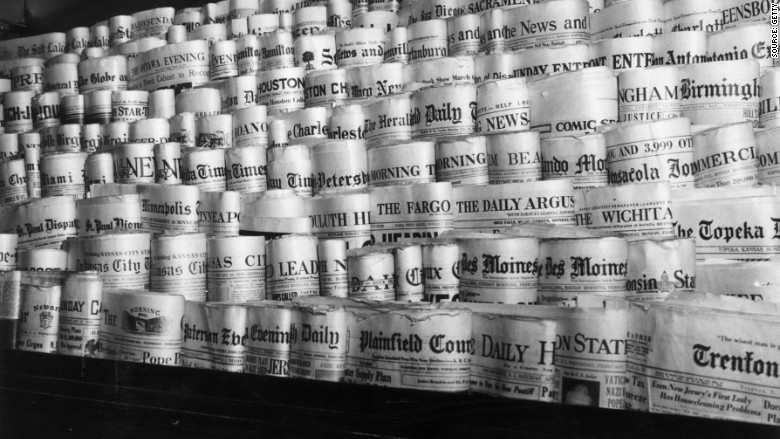
Four years ago, Amazon founder Jeff Bezos was asked if his company's "ruthless" pursuit of market share was driving book stores out of business.
"The Internet is disrupting every media industry," Bezos said. "People can complain about that, but complaining is not a strategy. And Amazon is not happening to book selling, the future is happening to book selling."
The future is also happening to newspaper publishers, and their latest effort to stave off change -- a bid for an antitrust exemption -- is unlikely to succeed, according to legal experts and Silicon Valley insiders who spoke with CNNMoney.
Earlier this week, the News Media Alliance -- which says it represents over 2,000 newspapers in the U.S., including The New York Times, The Washington Post and The Wall Street Journal -- said it would begin seeking an antitrust exemption from Congress in order to negotiate collectively with Google and Facebook, which together receive an estimated 60% of all U.S. digital advertising revenue.
Currently, each news organization negotiates with Google and Facebook independently. In an editorial for the Wall Street Journal, NMA President David Chavern said publishers needed to "open a unified front to negotiate with Google and Facebook—pushing for stronger intellectual-property protections, better support for subscription models and a fair share of revenue and data."
But antitrust experts say the chances of securing such an exemption are highly unlikely.
"I don't want to say it's impossible, but it's pretty small, like 10 percent," Herbert Hovenkamp, a University of Pennsylvania professor who has been dubbed the "dean of American antitrust law," told CNNMoney. "Antitrust exemptions are extremely rare, and I don't think this Congress is going to have all that much sympathy for the media. Even if this Congress were sympathetic, this Congress is not getting very much done."
Even Chavern acknowledges the challenge. "It's not going to be easy," he told CNNMoney. "[Congress] has trouble naming a post office, so legislating, period, is difficult."
By pursuing the exemption anyway, Chavern and the NMA have annoyed executives at both Google and Facebook, sources at both companies said. Those sources believe the NMA is only calling for the exemption in order to increase public pressure on the tech companies as newspapers negotiate for more favorable revenue and data-sharing agreements.
"They're making us out to be the bad guys," a Facebook executive said. "The truth is we're stuck with each other, and it is totally in their interest to work with us."
Chavern stresses that the NMA's efforts are sincere: "It's really hard to get antitrust exemption, but I think people understand in this business it's really important at this moment in time," he said.
Meanwhile, the NMA is also facing protest from within its own industry. On Monday, the Local Media Consortium, which represents more than 70 local media organizations, took issue with the NMA for speaking on behalf of small local papers that rely on tech partnerships.
"We face Google, Facebook, Apple and the broader tech industry as partners, not adversaries," Rusty Coats, LCM's executive director, wrote. "We are confident of our value, and the value we bring to our tech partners."
Coats said he worried that tech companies would look at the NMA's protests as a "protectionist reaction of an industry that lacks cohesion."
Indeed, the Google and Facebook sources who spoke with CNNMoney said it seemed as if the NMA's efforts were only serving to antagonize a partner that its members rely on for ad revenue.
Both Google and Facebook already work with individual news organizations on revenue and data sharing, though not always in ways those news organizations like.
As an example, Facebook is currently experimenting with a subscription model that would give users access to a certain number of Instant Articles before they hit a paywall, sources at the company said. Facebook wants to set the number of free monthly articles at 10, while the newspapers want that number to be lower.
"We're committed to helping quality journalism thrive on Facebook," Campbell Brown, Facebook's head of news partnerships, said in a statement. "We're making progress through our work with news publishers and have more work to do."
Google similarly said it had developed numerous specialized products and technologies to help distribute, fund, and support newspapers. "This is a priority and we remain deeply committed to helping publishers with both their challenges, and their opportunities," a spokesperson said.
For now, the efforts Facebook and Google make to work with publications -- while perhaps slanted towards the tech companies -- are likely to be the newspaper industry's best hope going forward.
Two days after Chavern's Journal editorial, there has been no real public indication that Congress would move quickly on an antitrust exemption.
"This discussion is very premature," Hovenkamp said. "Even if it were ready to go, the chances of Congress doing anything about it are very, very small."


